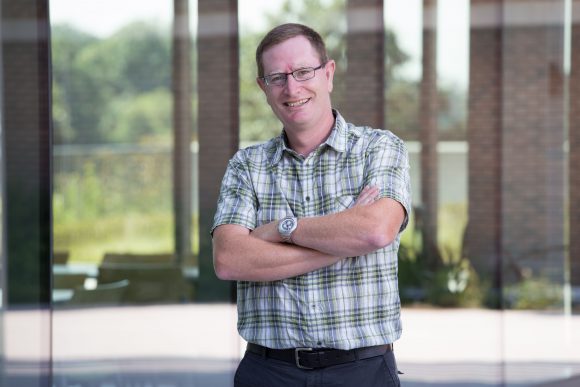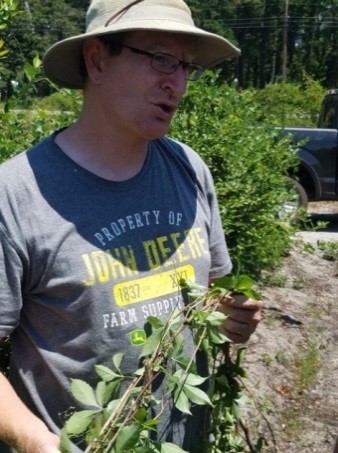
Thierry Besançon, assistant extension specialist in weed science in the Department of Plant Biology.
Thierry Besançon is the new assistant extension specialist in weed science in the Department of Plant Biology at Rutgers. He will spend the foreseeable future researching weed control in cranberry and blueberry, and developing sustainable weed management strategies for specialty crops working out of the Philip E. Marucci Center for Blueberry and Cranberry Research and Extension in Chatsworth, NJ.
Besançon grew up in Epinal, the capital and largest city in the department of the Vosges in northeastern France, and close to the border with Switzerland and Germany. He worked for 10 years in Europe on pests and disease management in stone fruit production. There, he also focused on the development of Integrated Pest Management threshold models and the prediction of fruit shelf-life in cold rooms.

Thierry Besançon.
He came to the U.S. to study for a Ph.D. in Crop Science at North Carolina State University, where he spent five years working on weed control through cultural practices and crop allelopathy in sorghum and other row crops of the southeastern United States.
In his new role at Rutgers, he’s looking forward to investigating alternative strategies to managing weeds, such as the use of cover crops, to help reduce the potential for herbicide resistance development in specialty crops. He and fellow researchers in the specialty crops weed science lab are also evaluating whether recent difficulties in controlling goosegrass (Eleusine indica) and annual bluegrass (Poa annua) in blueberry may be caused by the development of herbicide resistance. To determine whether they’re correct in their assumptions, they will be evaluating the occurrence of cross- and multiple-resistance to other herbicides as well as investigating the molecular and physiological mechanisms associated with resistance.
He is also deeply involved in training and educating growers and extension personnel. This led to the successful collaboration with other weed scientists in the eastern U.S. in the publication of the Mid-Atlantic Field Crop Weed Management guide and Mid-Atlantic Commercial Vegetable Production Recommendations. Besançon has recently published papers in Weed Science, Weed Technology, Agronomy Journal, Advances in Agriculture, and the International Journal of Agronomy and Crop Sciences.
One of the challenges that Besançon and his colleagues will face is getting to the root, pardon the pun, “of the biology, ecology and control of Carolina redroot (Lachnanthes caroliniana), a species native to New Jersey and a competitive weed of cranberry bogs.”
He’s also eager to start multidisciplinary collaborative research with other faculty members within the Department of Plant Biology. “There are many new emerging challenges in specialty crops for efficient weed control, creating unique opportunities for research on alternative weed management strategies.”
When he’s not immersed in research on weeds at Marucci, he’s indulging his passion for plants. He’s passionate about botany as well as birding. “I like to spend time hiking with my wife and daughter in natural areas of New Jersey.” He also likes photography and, in a nod to the Garden State’s rich breeding history and deep roots in agriculture, he loves “gardening of heirloom vegetables.”
Editor’s Note: This faculty profile is part of an ongoing series highlighting new faculty hires and faculty promotions in the School of Environmental and Biological Sciences.

